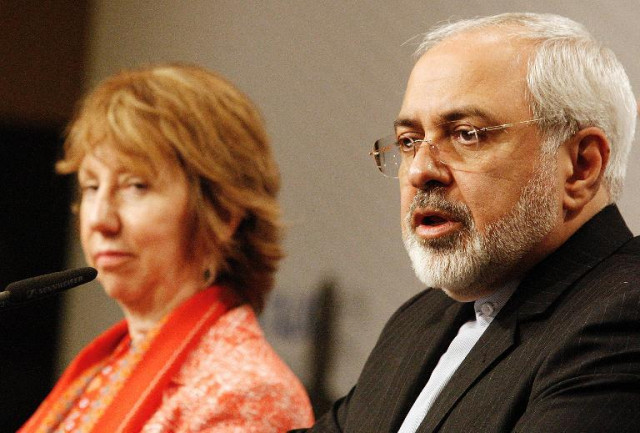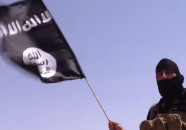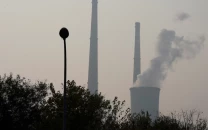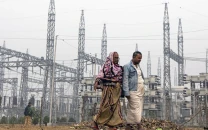Iran nuclear talks to 'move to next phase' in May
The fourth and next round will be held in Vienna again from May 13.

EU foreign policy chief Catherine Ashton and Iranian Foreign Minister Mohammad Javad Zarif give a press statement on the second day of talks at the UN headquarters in Vienna, Austria on April 9, 2014. PHOTO: AFP
"We will now move to the next phase in the negotiations in which we will aim to bridge the gaps in all the key areas and work on the concrete elements of a possible comprehensive agreement," said EU foreign policy chief Catherine Ashton who is the chief negotiator for the world powers.
In a statement repeated in Farsi by Iran's foreign minister Mohammad Javad Zarif, Ashton said a "lot of intensive work will be required to overcome the differences which naturally still exist at this stage in the process."
Both described the latest round between Iran and the five permanent members of the UN Security Council plus Germany as "substantive and detailed ... covering all the issues which will need to be part of a comprehensive agreement."
The permanent council members are the United States, Russia, China, Britain and France.
The fourth and next round will be held in Vienna again from May 13, they said.
A senior US administration official involved in the talks had said last week that the negotiators hoped to make enough progress in this round to begin drafting a deal in May.
In November the two sides reached an interim deal under which Iran froze certain parts of its nuclear activities in return for minor relief from painful Western sanctions.
But Iran has not permanently dismantled any of its nuclear equipment and can fully reactivate its facilities if it wishes when the deal expires on July 20.
US Secretary of State John Kerry told US lawmakers Monday that the theoretical period needed for Iran to produce a weapon's worth of bomb material -- if it chose to do so -- was "about two months".
In order to greatly extend this "break-out" time, the six powers want the final deal to see Iran reduce permanently, or at least long-term, the scope of its programme.
The deal may involve Iran slashing the number of centrifuges -- used to enrich nuclear material -- changing the design of a new reactor at Arak and giving UN inspectors more oversight.
Other outstanding thorny issues include Iran's continued research and development of ever more advanced centrifuges and the Islamic republic's ballistic missile programme.
Iran's supreme leader Ayatollah Ali Khamenei said Wednesday "that Iran's activities in nuclear research and development as well as its nuclear achievements will never be stopped."
Iran's lead negotiator at the talks said late Tuesday that on "certain questions" both sides were narrowing their differences but that the negotiations remain "difficult and complicated".
Any agreement will need to be sold to sceptical hardliners both in the United States and Iran as well as to Iran's arch enemy Israel, widely assumed to have a nuclear arsenal itself.
US-Iran spat
Threatening to throw a spanner in the works is the crisis over Ukraine which has led to the biggest standoff between Russia and the West since the Cold War.
Russia's chief negotiator, Sergei Ryabkov, fired a warning shot last month, saying Moscow might "take the path of counter-measures" on Iran if pushed too far.
On Tuesday however Ryabkov sounded a more conciliatory note, telling ITAR-TASS it would "not be wise" to turn Iran into a "bargaining chip".
Moscow and Iran are said to be negotiating an oil-for-goods barter deal that would undermine Washington's sanctions efforts, a strategy the US credits with getting Tehran to the talks in the first place.
Another issue casting a cloud over the talks is the spat between Tehran and Washington over Iran's selection of a new UN ambassador allegedly linked to the 1979 American embassy hostage crisis.
The White House said Tuesday Hamid Aboutalebi was "not viable" and on Monday the US Senate passed a resolution that would deny the veteran diplomat a US visa.


















COMMENTS
Comments are moderated and generally will be posted if they are on-topic and not abusive.
For more information, please see our Comments FAQ